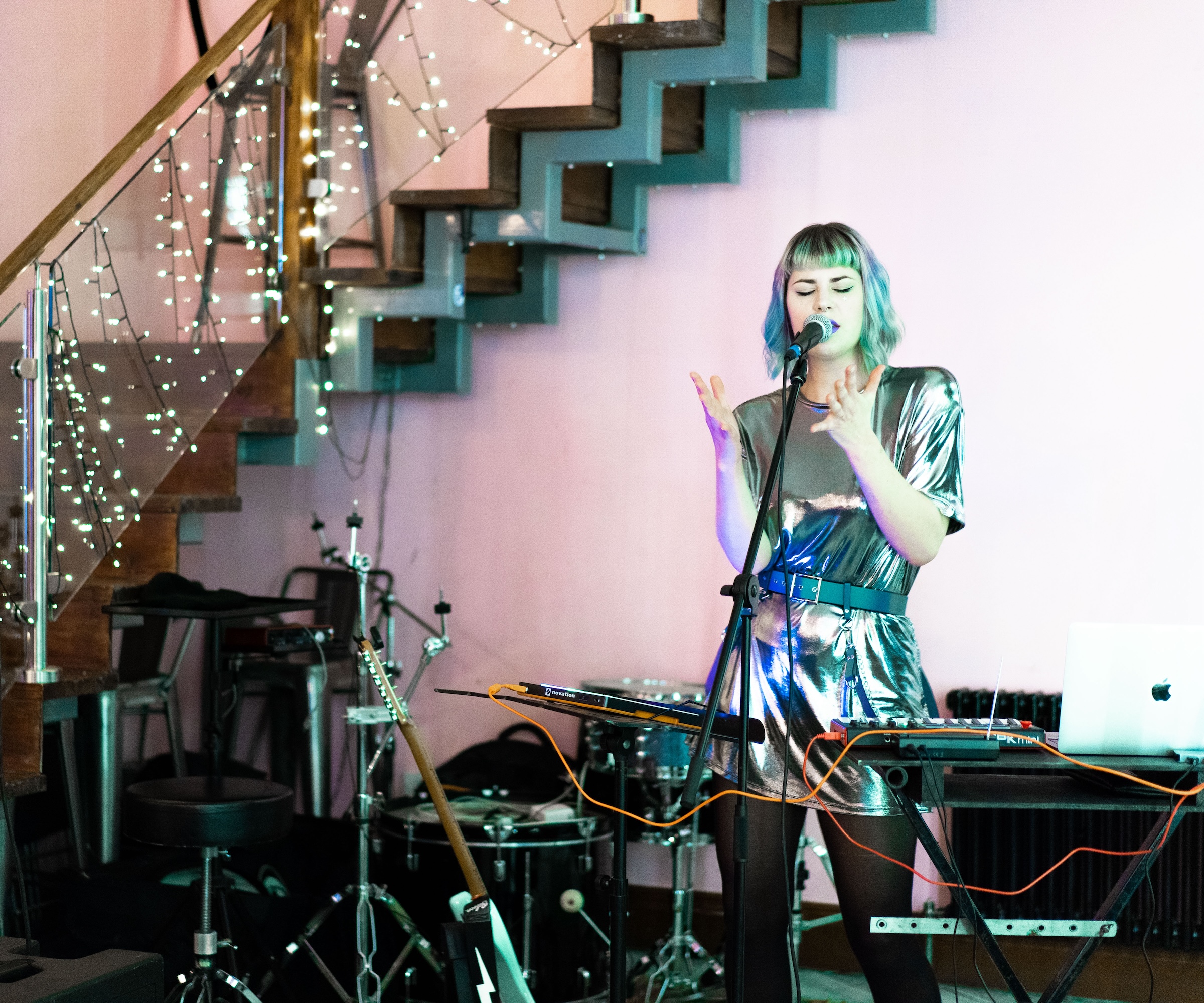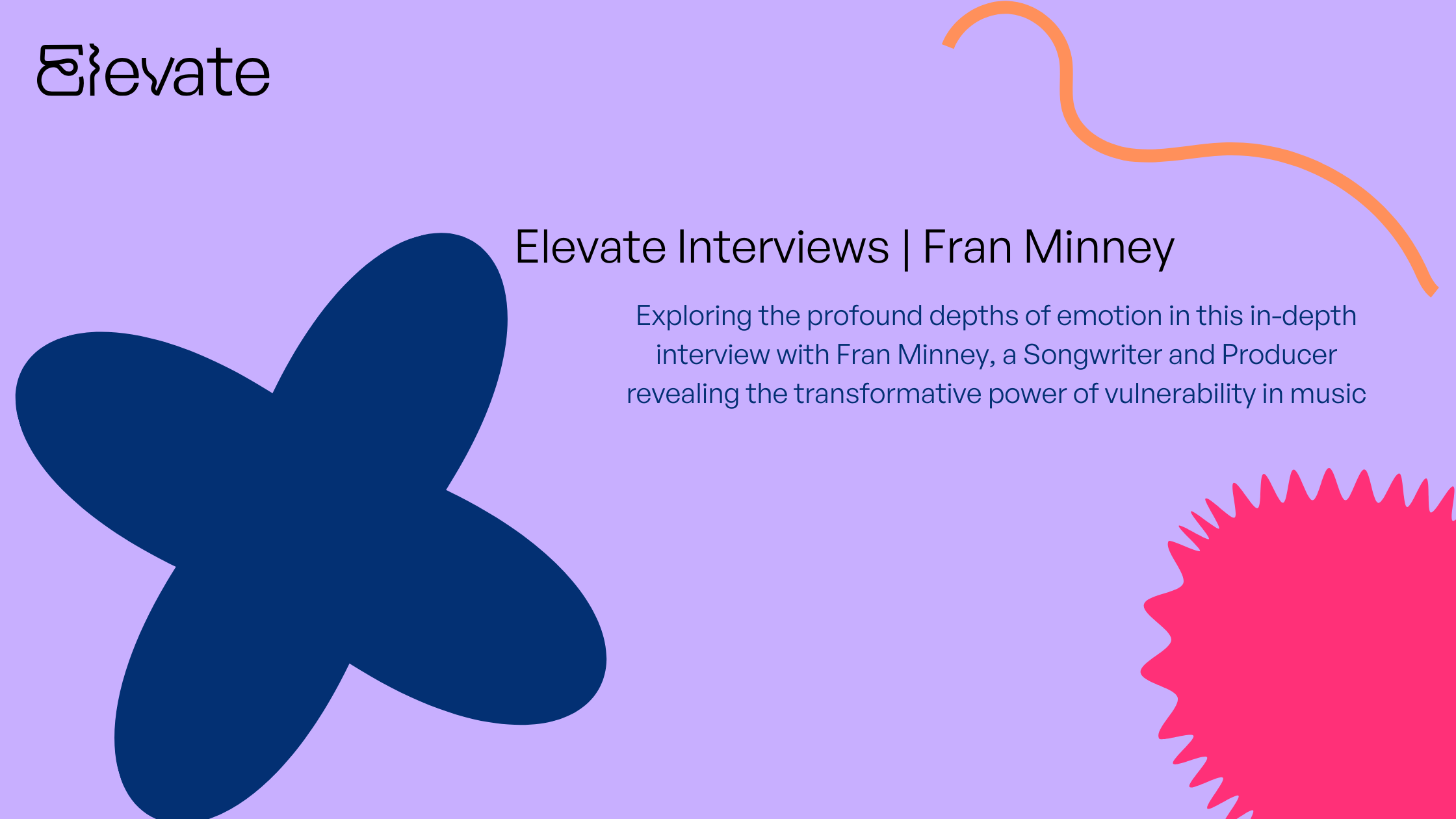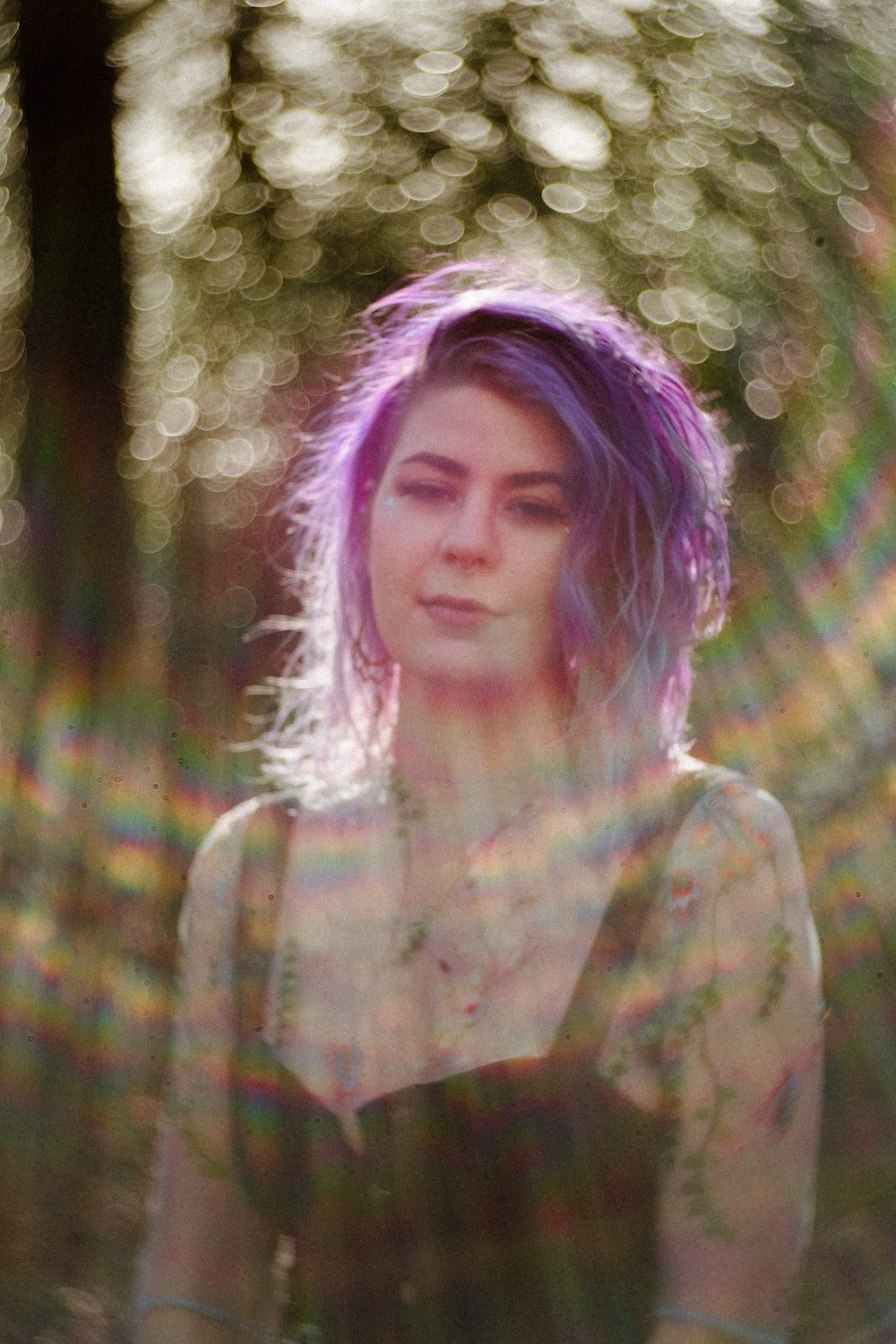Elevate Interviews | Fran Minney
As part of our series of interviews focusing on gender in the music industry, we spoke to Fran Minney, a songwriter and producer.
She’s a heartfelt live performer, who dives bravely straight down to difficult emotional depths in her writing.
We discussed how imposter syndrome affects women and non-binary artists, with Fran admitting to suffering from self-doubt in creative spaces. She also speaks of the urgent need to make spaces safer for women and non-binary artists.
Introduce yourself!
My name is Fran Minney. I am a singer, songwriter, musician and producer of what I would describe as shimmering, colourful folk-pop music. I use Ableton and looping to create songs that look at themes of nature and are very personal.
How do you feel about being named a woman producer, as opposed to simply a producer? Do you ever feel you’re treated as a novelty? Because producers who are men don’t!
Firstly, even though I’m not male, I’m definitely still coming from a place of privilege by being white and cisgender. So, I do have to acknowledge that I think I’ve had a much easier ride than a lot of people have, but there certainly have still been things I’ve experienced.
I’ve only started really producing in the last handful of years, compared to how long I’ve been songwriting, but I think I’ve been lucky that the fact I’m a female producer doesn’t tend to really be highlighted by other people.
But I will say that one of the reasons it’s taken me so long to go into production has been this internalised fear that my work is going to be judged more harshly because I’m not a man. The fear that if I’m not good enough, some people are going to extrapolate that to all women.
When I started my BA in Popular Music undergraduate degree, there were only one or two women on the production course. There was this kind of general talking down about them from other students. And that just kind of instilled a bit of fear in me, I guess, as a woman going into production.
What do you think some of the barriers are that are faced by non-men in the industry?
People inappropriately touching during performances; being sexualized in business dealings and while session singing. I’ve had things like not getting gigs through agencies, and finding out they have only solo men on the books, the only women in a duo or band with men. Obviously, that can be attributed to many things, and I initially assumed it was personal on some of these occasions.
In women-only spaces, it feels safer to make a mistake. No one’s like, “Oh my god, I can’t believe you got that wrong,” as often as in a male-dominated space. I’ve been aggressively put down for not using the right guitar pick in an agency audition, and when a man has perceived that I’ve made a mistake in a practice room. Not being great at something right off the bat is met with mocking. Guys would laugh in my face about things like trying to bring in an idea on guitar when I wasn’t able to fully play it, or when showing them a rough demo.
Men will insist that I’m wrong about something, and I have to tell them I had a man double-check it.
Have you got any advice on how to deal constructively with that sort of thing when it happens?
I would say it’s taken me a long time to learn to deal with it at all. But I think just drawing attention to these things is sometimes the best way to go.
With one agency, for example, it was all white men on the books except a friend of mine, and I was the only woman. We were both getting passed over for work every time, transparently in the group chat.
In the end, I asked the agency how the booking system works if it’s not first come first serve. They didn’t have an answer for me, but at least that will hopefully make them pause for thought and decide to have a process in place to ensure it’s not just white men being chosen.
Positive change often starts from the bottom, but it should come from the top. How would you like to see a company like RouteNote represent and support creative women and gender-expansive artists, labels and communities?
I would say asking that question to as many people as possible is probably one of the best things.
I think just the fact that you have non-male staff at RouteNote is a wonderful thing. Having more diverse people on the staff is going to help in and of itself.
As well, more diversity around material that’s going to be platformed, and getting as many opinions on it from as many diverse people as possible.

Can you remember the first time you noticed it was more difficult to be a woman navigating the music industry?
I can’t remember literally the first time, but I definitely was aware when I was growing up that there weren’t many role models for me. I didn’t really see female guitarists, for example.
Without my sister playing guitar and seeing Brody Dalle play bass, I maybe wouldn’t have learned either of those instruments. Even with those two role models, I assumed it wasn’t for me, I still had to really work hard to overcome that feeling.
I used to love the music that was on at Download Festival. But the atmosphere of the festival itself was really disappointing, and I remember seeing jokes being made about no women being on the lineup and that feeling pretty hurtful.
In hindsight, there’s been discrimination in one way or another in a lot of situations, and scenarios that have made me feel inadequate as a female artist. At the time I either accepted it as the truth or it was simply the normality. I get the sense a lot of people have experienced the same thing.
Certainly, there’s this lack of self-assurance, even with women who are really good at what they do. Take teaching for example. When female friends who work in music put themselves forward, there seems to be a common sense of worry about not being good enough. That’s in complete contrast to men I know who will just be like: “I’m going to teach this instrument I’ve never played before, and I’m just going to learn a week ahead of the student.”
I can’t do that. It feels like, who do I think I am? Thinking I’m good enough to teach when sometimes I don’t even feel I can express ideas in creative spaces.
How can we make spaces like the studio and live events safer for women and non-binary artists?
Take these things seriously. Event organisers have a responsibility to keep an active eye on things and make things safe. Performers need covert ways to let staff know that something’s wrong because sometimes it’s not going to feel safe to outrightly have a conversation with the person who’s acting inappropriately.
Doing the things that feel obvious can make an enormous difference because some venues, for example, are not switched on to it. If that behaviour is obviously happening on a stage, like inappropriate touching of a performer, security should remove that person from the venue. It shouldn’t be down to the victim to convince security to act – or have to explain why they now feel unsafe to walk to their car on their own.
How do you feel about asking artists themselves to work towards equality, for example pledging not to sign up to events that have less than half women and non-binary artists on a festival line up. Is it fair to put that on artists, not organisers?
I do not think it should be the responsibility of the artist. It’s asking artists to hold back their own careers and potentially turn down financial opportunities.
I certainly don’t want to encourage any artist, especially from non-male groups to turn down money and exacerbate the gender pay gap because they feel it’s their responsibility to fix wider problems in the industry.
I would never hold it against an artist for still performing at an event where they may be the only female-identifying or non-binary person. Use your platform! Get out there, and hopefully, the organisers will do better in future.
I will say that I think it’s a very noble idea, as an artist, to turn down events that aren’t meeting those requirements. It’s a grey area as well and depends very much on the event and on the organisers.
There shouldn’t be any forced competition between any gender. Have you ever felt pitted against other women?
Yes. 100%.
There was an experience early on in my career where I was actively pitted against other women. A group of us were told that we were being observed and that if we didn’t act competitively there would be repercussions, in an attempt to make the other women present work harder.
But we saw what was happening, and although we felt the pressure, we wouldn’t treat other people badly. Thankfully it worked out okay, the person encouraging this was stopped, but it was such a strange, unbelievable experience.
10 years ago, I remember asking another female solo performer, one of my closest friends at the time, for advice, and she refused to help. She took the competitiveness very seriously, thinking I was trying to take work from her.
That was a sad one. Thankfully, it has not been my experience since then. And as much as possible, I’ve done what I can to be supportive of other people when they have come to me for help.
Nowadays it’s more of a supportive community than competitive.
Can you name some organisations that are particularly good at lifting up women and gender-expansive people in the music industry? For example, through funding or providing educational opportunities.
PRS for Music offer Women Making Music funding which is fantastic, I think it’s a wonderful thing. Help Musicians helped support me through my master’s degree, which I was really grateful for.
And Girls I Rate are great for uplifting women. It’s nice to see these things becoming more and more prominent!
What made your path to success easier?
I think approaching things with a community mindset, with the idea of supporting and uplifting each other, has been a wonderful thing and I don’t know where I would be without it.
I know that “networking” is the word that people like to use, and it feels a bit gross to me. Trying to sell myself to people with my unique sales pitch feels transactional and has always made me feel uncomfortable.
But just having conversations with people means eventually it will come up naturally. In the end, the way that I’ve been able to find success has been a result of networking, but it wasn’t cold or corporate. It really was seeing the music community for what it is – a community – and befriending people the way you would regardless.
Essentially, putting yourself out there and being kind to other people!
I’m interested to hear your opinion on removing gender from awards show categories, for example making the Brit Award for Best Artist gender-neutral.
My concern is just that it could turn into an excuse to say that non-male acts just weren’t good enough to make the cut. Hopefully, that won’t be the case.
I think that right now, I want to see how it plays out because I do like the sentiment of it. Sometimes having this separation can actually help with recognition, but then ideally we wouldn’t need to have to do it that way.
One of the most striking things was the lack of recognition for K-pop artists in awards categories while they were breaking records. I don’t even engage in that K-pop space all that much, but even I can see from the outside they do an amazing thing.
What projects do you have lined up for 2023?
There’s an EP coming and at least one more single! It’s quite a new direction for me, in a sense, because the EP is covering a few different genres.
I’m keeping my storytelling throughout, but experimenting with different sounds. I’ve really tried to push myself production-wise on it as well.
Emotionally I’ve found it really challenging. I’ve had to work on the production in small chunks. It’s focusing on some difficult themes like abusive relationships, following this journey from helplessness to empowerment.
Look for the RouteNote Elevate badge to learn more about gender diversity in music and discover some incredible diverse artists.


